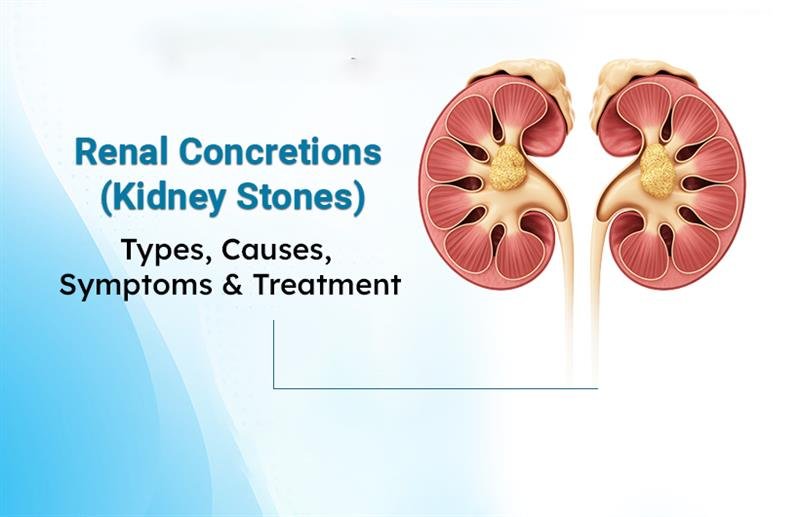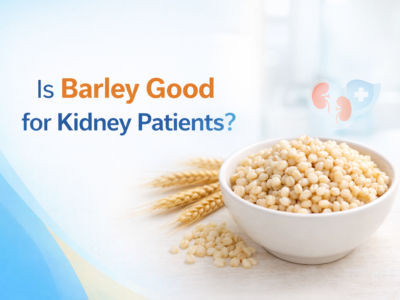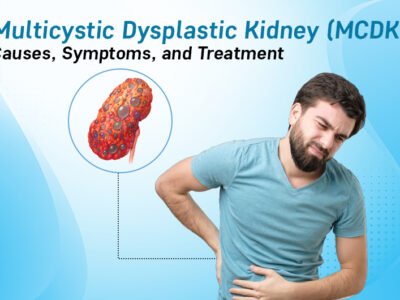Renal concretions, commonly known as kidney stones, are hard deposits that form in the kidneys when minerals and salts in the urine crystallize. These stones can vary in size, from tiny grains to larger masses, and may cause severe pain or complications if left untreated. Understanding the types, causes, symptoms, and treatments can help in early detection, effective management, and prevention of recurrence.
How Kidney Stones Form
Kidney stones develop when urine becomes concentrated, causing minerals like calcium, oxalate, and uric acid to stick together and form crystals. Over time, these crystals can grow into stones. Factors like dehydration, diet, genetics, and certain medical conditions increase the risk of developing kidney stones.
When the balance between stone-forming substances (e.g., calcium, oxalate) and stone-preventing substances (e.g., citrate) is disturbed, stones are more likely to form.
Types of Kidney Stones
1. Calcium Oxalate Stones – Most Common
- Formed mainly from calcium and oxalate.
- Causes: High-oxalate foods (spinach, nuts, chocolate), dehydration, metabolic issues.
- Prevention: Drink plenty of water, reduce high-oxalate foods, and maintain moderate calcium intake.
2. Uric Acid Stones – Linked to High Purine Intake
- Form in acidic urine.
- Causes: Excessive purine-rich foods (red meat, shellfish), gout, dehydration.
- Prevention: Limit purine intake, stay hydrated, and maintain a balanced diet.
3. Struvite Stones – Associated with Urinary Tract Infections (UTIs)
- Struvite Stones develop due to bacterial infections in the urinary tract.
- Causes: Certain bacteria raise urine pH, promoting stone formation.
- Prevention: Treat UTIs promptly; in recurrent cases, preventive antibiotics may help.
4. Cystine Stones – Rare but Recurrent
- Result from a hereditary condition called cystinuria.
- Causes: Genetic mutation affecting cystine transport in the kidneys.
- Prevention: High fluid intake, urine alkalization, and medications to lower cystine levels.
5. Mixed Kidney Stones – Combination Stones
- Contain multiple minerals, e.g., calcium oxalate and uric acid.
- Causes: A Combination of diet, metabolic issues, and other risk factors.
- Prevention: Personalized plan based on stone composition.
Causes and Risk Factors
Anyone can develop kidney stones, but some common risk factors include:
- Dehydration: Insufficient fluid intake.
- Diet: High salt, sugar, or protein consumption.
- Medical Conditions: Gout, hyperparathyroidism, and inflammatory bowel disease.
- Medications: Diuretics, calcium-based antacids, and some antivirals.
- Lifestyle: Sedentary habits and poor hydration.
Symptoms of Kidney Stones
Symptoms vary depending on stone size and location, and may include:
- Severe back or flank pain (renal colic)
- Pain radiating to the lower abdomen or groin
- Blood in urine (hematuria)
- Frequent urge to urinate
- Cloudy or foul-smelling urine
- Nausea and vomiting
- Fever (if infection is present)
Diagnosis of Kidney Stones
Timely diagnosis is essential for effective treatment. Common methods include:
- Urine Analysis: Detects crystals, infection, and pH changes.
- Blood Tests: Check calcium, uric acid, and kidney function.
- Imaging Tests: Ultrasound, X-ray (KUB), CT scan to locate and size stones.
- Stone Analysis: Identifies stone composition to guide prevention.
Treatment Options for Renal Concretions
Treatment depends on stone size, type, and patient health:
1. Medication for Small Stones
- Alpha-blockers relax the ureter muscles for natural stone passage.
- Pain relief with NSAIDs or acetaminophen.
- Drink plenty of water to aid passage.
2. Shock Wave Lithotripsy (SWL)
- Uses sound waves to break stones into smaller pieces.
- Ideal for medium-sized stones.
3. Ureteroscopy and Laser Treatment
- A thin scope reaches the ureter or kidney; a laser breaks the stone for removal.
- Used for stones stuck in the ureter or kidney.
4. Percutaneous Nephrolithotomy (PCNL)
- Minimally invasive surgery for stones larger than 2 cm.
- Small incision in the back allows direct stone removal.
5. Open Surgery (Rare Cases)
- Reserved for very large or complex stones not treatable by other methods.
Prevention of Renal Concretions and Recurrence
Prevent kidney stones with lifestyle changes:
- Hydration: Drink 2–3 liters of water daily.
- Diet: Reduce salt, processed foods, and excess protein.
- Calcium: Maintain moderate dietary intake; avoid high-dose supplements.
- Oxalate Control: Limit foods like spinach, beets, and nuts.
- Sugar Intake: Minimize sugary drinks, especially cola and fructose-rich beverages.
- Regular Checkups: Especially if you have a history of stones.
When to See a Kidney Stone Specialist
Consult a specialist immediately if you experience:
- Severe, persistent side or back pain
- Blood in urine
- Fever or chills
- Difficulty urinating
- Vomiting that prevents fluid intake
Early consultation can prevent complications like urinary tract infections, kidney damage, and recurring stones.
Conclusion
Kidney stones are common but can cause serious discomfort and health issues if untreated. Knowing the types, causes, symptoms, and treatment options empowers patients to manage their kidney health proactively. Prevention through hydration, diet management, and regular medical care is the most effective approach.
For expert care, consult Dr. Ravi Bhadania, the Best nephrologist and kidney stone specialist. With advanced diagnostic tools and minimally invasive treatment methods, Dr. Ravi Bhadania ensures effective relief and long-term prevention of kidney stones.
Book your consultation today with Dr. Ravi Bhadania and take the first step toward a healthier, pain-free life.


